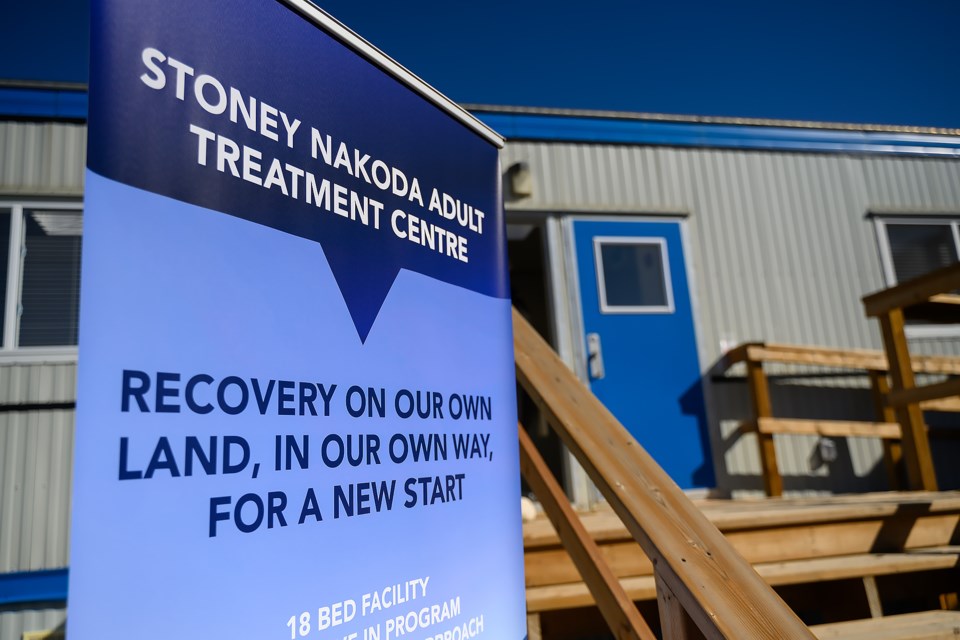ÎYÂRHE NAKODA – Two fatal drug poisonings in Îyârhe (Stoney) Nakoda First Nation since late last week have the community on high alert.
Nakoda Emergency Services says two Nation members have died since Thursday (July 18) in separate incidents and there has been a surge in local first responders attending to drug poisonings.
“We’ve seen a spike in the number of calls related to the use of illicit drugs and overdoses thereof,” said Nakoda Emergency Services director Reg Fountain.
Fountain did not have any further information on the first fatality, which was reported July 18 in Eden Valley. In the second overdose case, a 39-year-old-man died at Mînî Thnî Saturday (July 20).
Nakoda EMS, Nakoda Fire and Mînî Thnî RCMP attended the latter call.
The back-to-back deaths prompted local first responders to issue a warning Monday (July 22).
“Additionally, our fire and EMS teams have responded to other calls where overdoses have occurred but were not fatal,” the warning states.
“It is possible that a bad batch of contaminated drugs has made its way to the Mînî Thnî and Eden Valley areas.”
In some cases, Naloxone – used to counteract opioid related drug effects – may not be sufficient in response.
“If [an opioid] is cut with something else or contaminated with another drug, it may cause cessation in breathing or other medical effects that Naloxone will not treat,” said Fountain.
If someone witnesses a suspected drug poisoning, the first line of response is to admit Naloxone and call 911. Naloxone kits are available at the Stoney Health Services Centre.
“If you recognize that the individual is still not breathing, then undertake rescue breathing, as it’s referred to, to keep the person alive until such time as EMS or fire services come on scene and can take over. By doing rescue breathing, it gives the individual who is experiencing drug poisoning side effects but not responding to Naloxone a much better chance of survival,” said Fountain.
Rescue breathing can be done alone or as a part of cardiopulmonary resuscitation (CPR), if an individual also has no pulse.
Fountain said he feels for those affected by the recent fatalities and urges anyone struggling with substance abuse to seek help.
“There are facilities and support mechanisms available on the Nation, whether it’s through Stoney Health Services and it’s mental health or harm reduction programs, or through Child and Family Services – depending on the age of the individual – to help deal with the stressors of life that may lead to the use of illicit narcotics or other substances,” he said.
Although they represent only 3.4 per cent of the Alberta population, First Nations people account for 20 per cent of all apparent unintentional opioid poisoning deaths between 2016 and 2022 according to a May 2024 Alberta Health Services substance use surveillance report.
“The proportion of apparent unintentional opioid poisoning deaths among First Nations has increased over time, from 14 per cent in 2016 to 25 per cent in 2021,” states the report.
In 2023, Îyârhe Nakoda First Nation opened a treatment centre in Mînî Thnî. A community-led task force was also formed in 2021 at the direction of Stoney Tribal Council in response to the number of drug poisonings and impact of illicit drugs in the community.
Some have also long called for Stoney Tribal Council to create bylaws banning drug traffickers found by RCMP from the community. However, no such bylaws have been implemented to-date.
The Outlook reached out for an interview with a member of the drug task force and Stoney Health Services’ harm reduction team but no-one was available by print deadline.
Mînî Thnî RCMP Staff Sgt. Chad Fournier said police have no further details to share regarding recent response to drugs on the Nation.
“Mînî Thnî RCMP is committed to preventing drug overdoses by conducting investigations into the transport and trafficking of opioids. We continue to work collaboratively with our community partners in our common goal of keeping residents safe,” he said in an email statement.
The Local Journalism Initiative is funded by the Government of Canada. The position covers Îyârhe (Stoney) Nakoda First Nation and Kananaskis Country.




